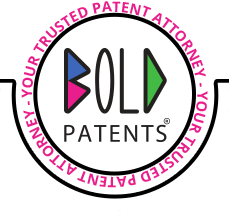Texas Patent Attorneys
If you create a new idea as an entrepreneur or other creative visionary, you need to know how you can protect that idea. A Texas patent lawyer can guide you in every step of the patent process, from patent searches to filing an application to defending your patent.
Getting a patent for your creation gives you a competitive advantage, whether you are a business owner or an individual looking to bring your invention to the market. We have locations in Austin, Dallas, Houston, Irving, Richardson, San Antonio and more. At Bold Patents, our team can help you achieve these goals with the following legal support:
We want to help you protect and profit from the idea that you brought to fruition. Our firm can aid individuals all throughout Texas, including in Houston, Austin, Dallas, Irving, and San Antonio. We can determine if you have a potentially valid patent by reviewing existing patents. Then, our team can help you craft and file your application while answering any of your concerns throughout the process.
Experienced Patent and Intellectual Property Attorneys
Bold Patents understands many aspects of intellectual property law. Our patent attorneys in Texas can use this knowledge to help you meet your goals, including with patents, trademarks, and other ways of protecting your innovation. We have years of experience in patent law, supporting individuals, families, and small businesses in pursuing their goals. Intellectual property law can be complex, but we can help by bringing years of unparalleled experience and resources.
After creating a bold idea, you need bold solutions. Our team can take the time to understand your personal goals, including your short-term and long-term hopes for making, protecting, and distributing your invention. By getting to know you, we can better determine what avenue of intellectual property protection can support your goals.
We can explain the options you have as well as the costs and benefits of each one. This helps us make your wishes a reality while allowing you to make informed choices about your financial future.
What Is a Patent?
A patent is a type of intellectual property protection. Other types include trademarks, copyrights, and trade secrets. All four of these kinds of intellectual property ensure that individuals and companies have the right to the ideas and inventions they create. Corporations are responsible for a significant portion of patents and other intellectual property protections, but anyone can file for a patent to protect their interests.
A patent grants the inventor of a creation the right to prevent other individuals from creating, using, or selling their invention. You may be able to get a patent on a new process, a new machine, a new design, or a new plant. A patent establishes your right to prevent others from profiting off your idea, and you are able to take legal action against a person or company that infringes on your patent.
How Is a Patent Beneficial?
When your invention is patented, you have control over the use, sale, and creation of that invention, including the ability to license it. You may already be a business owner, and this patent can give you a significant competitive edge. This can help you increase your profits in your area of the market.
Even if you are not a business owner, a patent on an invention can help you profit from your creation. You can begin a business based on your patented idea. Depending on the type of patent, the protections granted by the patent exist for between 15 and 20 years.
How Do You Get a Patent in Texas?
Filing a patent in Texas is a federal process, so it is very similar from state to state. You file an application with the U.S. Patent and Trademark Office (USPTO). Some of the common steps involved in this process include:
- Documentation: Clearly document your invention, such as via writing, drawing, rendering, or creating a prototype. Documentation should cover its function, use, abilities, and other unique aspects.
- Eligibility: Conduct a patent search to determine if you have created something new or if you would infringe on an existing patent. You should also understand the definition of what makes a valid patent and ensure that your invention meets those criteria. During this process, you may determine that your intervention is better eligible for another type of intellectual property protection.
- Type of Patent: There are three types of patents, and it’s important to determine which patent type your invention fits under.
- Application Draft: Draft your patent application, ensuring that you have the relevant documents. This may include a description, your rendering, some other type of documentation, and other required information about the invention.
- File Application: Submit your application to the USPTO, and pay the required filing fees for your type of patent application.
- Track Application: You can then follow the progress of the application as it is examined by the USPTO. That way, you can remain up to date and know if you need to provide any information or take other actions.
An attorney is incredibly beneficial during this process. Your attorney can answer any questions you have about the patent process. They can review the application draft and ensure that it meets the criteria and has the essential information. This can help avoid administrative delays or other errors.
Types of Patents Offered by the USPTO
There are three types of patents that you can file for, depending on the type of invention that you are hoping to protect. These patents are:
- Utility Patents: These are the most common type of patent. They exist to protect an invention or improvement of a process, a machine, a composition of matter, or an article of manufacture. This could include a business method, software, a device, or a formula. These patents last up to 20 years.
- Design Patents: This type of patent exists to protect the invention of a new, innovative, and ornamental design for an item of manufacture. This may include a specific shape, arrangement, or appearance of a consumer or commercial product. It does not patent the function of the product. Design patents last for up to 15 years.
- Plant Patents: This patent can protect the creation, discovery, or asexual reproduction of a distinct, new variety of plant. This includes cultivated mutants, hybrids, sports, and newfound seedlings, but not a plant that is found uncultivated or tuber-propagated. These patents are valid for up to 20 years.
Typically, an invention only meets the qualifications for one type of patent, although there are exceptions. In these cases, you can determine which patent is most effective in supporting your goals.
Most patents last until the end of their term and expire. However, some patents can have extended or adjusted protections. Your attorney can determine if you may qualify for those exceptions and what other forms of protection can protect your creation.
What Qualifies as a Creation That Can Be Patented?
The basic requirements for an invention or idea to be eligible for a patent include:
- The invention can be used, works, and is not theoretical.
- There is a clear explanation of how someone can create the invention and use it.
- It is a new idea, not something that has already been created.
- It is not an obvious creation or an obvious alteration of an existing invention.
There are also some things that cannot be patented. These restrictions prevent individuals from patenting:
- Laws of nature
- Abstract ideas
- Suggestions
- Existing natural phenomena
- Nuclear or atomic items used in an atomic weapon
If your creation cannot be patented, this doesn’t mean that you are unable to protect it. Trademarks, copyrights, and trade secrets are other types of protection for intellectual property, and this could help shield or give you certain rights to the idea.
Who Is Able to Apply for a Patent?
The inventor of the idea is usually the only party able to file for the patent. Your legal representative can also apply. If there are two inventors, they can file jointly. There are some exceptions that would prevent the inventor from filing, including if the inventor:
- Is dead
- Is legally incapacitated
- Refuses to apply
- Cannot be found
There are other limited circumstances in which another party can file for a patent. However, if you are a non-inventor and the inventor did not assign you the invention, you cannot file for a patent. This is true, even if you contributed money to the invention.
How Can a Patent Attorney in Texas Help You?
Although it is not required that you work with a patent attorney in Texas, there are many benefits to having the information and resources of a patent attorney and an intellectual property law firm at your side. You can have legal advice and protection, straightforward guidance through the USPTO proceedings, and generally have a more successful application process. At Bold Patents, we can provide many services for intellectual property and patents, including:
- Determining Patent Eligibility: Our attorneys can look over your invention, ensuring that it meets the USPTO definition for a patentable creation, fits the definition of a type of patent, and is not an idea that has been patented. We can help you search the patent database and determine if you have an idea that qualifies for a patent.
- Creating Your Patent Application: It’s crucial to have an accurate and complete application to file. Our attorneys can help you draft, review, and file your application. By having the knowledge of a licensed intellectual property attorney, your application is more likely to move smoothly through the USPTO examination process.
- Protecting the Rights of Your Patent: If your patent rights are infringed upon, skilled legal support can help you take the right steps to address it. If another party is claiming that you are infringing on their patent rights, either with your actions in business or with your own patent, we can also give you the support you need. Our firm can protect your rights and your ability to protect your invention.
A patent lawyer has a significant level of patent law knowledge as well as the ability to understand your invention. At Bold Patents, we use this experience to support you from the beginning to the end of your patent journey.
What Is the Cost of a Patent in Texas?
There are several different costs to filing for a patent, depending on factors like the type of patent and the size of the entity applying for that patent. You also want to consider the fees to search for existing patents to check if you are infringing on another patent. The USPTO fees range from $44 to $320 for basic filing, and issue or reissue fees can range from $148 to $1,200.
If you are considered a micro entity filing for these patents, you will typically have filing fees on the low end of this range. Small entities have higher fees than micro entities, but they are still often lower than the standard fee. Fees for utility patents tend to be higher than design or plant patent fees.
It’s also important to consider the costs of a patent attorney. While hiring an attorney costs you more initially, it can end up making the process of securing a patent faster and more successful. This can help you protect your invention more quickly and begin profiting from it. Working with an attorney also helps you protect your rights, which can provide you with better patent protection.
How Long Does It Take to Get a Patent in Texas?
Many factors can influence the timeline for receiving a decision on your patent application. This includes how complex your invention is, whether there are any errors on your application and the amount of time you take to respond to a request for additional information. It can also rely on the current workload of the USPTO office that you submit your application to.
When you work with an attorney, you can determine what is a likely timeline for your unique situation. Your attorney can also remain on top of the status of your application, helping you respond quickly to any requests.
Find Your Industry’s Patent Requirements
It’s important to get targeted patent guidance for your specific industry. Click on your industry below to discover specialized patent requirements, strategic approaches, and how our attorneys can transform your ideas into protected assets.
Working With Exceptional Patent Attorneys in Texas
The team at Bold Patents knows how difficult it can be to navigate the USPTO system, grow your business, and protect your personal and financial interests. We can help make it easier. When you create something new, you should work to protect that. Contact Bold Patents today to learn how we can help you apply for a patent or another form of intellectual property protection.
What Others Have Said About Bold
Patents’ Law Firm!
My experience with the BOLD team has been fantastic every step of the way. I started not knowing anything about the process, and now I'm happy to say I'm two patents and counting with the BOLD team. They really make it easy. Thanks BOLD!
-Patrick Furlong
It has been an absolute pleasure to work with Bold Patents. They are extremely knowledgeable in their areas, prompt with their communications & responses, transparent & honest with their findings, break complex IP information into simple & understandable terms. Each & every member that I have interacted with has been...
-Hndle LLC Team
The Bold Patents team from day one maintained a feeling of support. BP definitely still provides “back in the day” customer service with a modern convenience. I never felt like I was just in a business deal. Even the fact that we are in different states had no effect on...
-Jessica Ramirez, Tolleson, AZ
Bold Patents gets the job done!!! They never left me out of the loop and they were there to answer any and every question I had. My patent attorney Houda is phenomenal. She took the extra step to get connected with my management advisory team and our progress skyrocketed. I’d...





